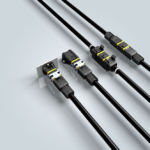~ How this household connector is pushing the boundaries of industrial and military applications ~
From computer keyboards and disk drives to printers and smartphone chargers, Universal Serial Bus (USB) connectors can be found nearly everywhere in consumer electronics. However, there’s an increasing demand for connectors that can operate in harsh environments, including telecommunications, military vehicles, industrial automation and medical equipment. Here Shaun Findley, European Director of Product and Purchasing at connector specialist PEI-Genesis, explores how to select USB connectors that are up for the challenge.
USB serves as an industry-wide standard establishing a specification for both cables and connectors while also providing protocols for connection, power and communication between computers and peripheral devices.
USB standards and connectors were initially developed to make it easier for external devices to connect to personal computers by replacing multiple connector types with a few standard connectors while also permitting greater data transfer rates. There are currently several different types of USB connectors, including Type-A, Type-B, Mini-A, Mini-B, Mini-AB, Micro-A, Micro-B, Micro-AB, with the latest being USB Type-C.
The USB standard and the connectors associated with it have existed since 1996 with four generations of specifications: USB 1.x, USB 2.0, USB 3.x and USB 4. There are also variations in between, such as USB 3.2. Each USB generation provides a different data rate speed and has its own maximum cable length and maximum power. It was developed to offer solutions to problems such as size constraints and data speeds.
Connector challenges
A traditional USB connector, such as the ones we use for charging our phones or connecting an external hard drive to a laptop, cannot withstand harsh environmental conditions. Harsh environment USB connectors must meet several criteria to be robust enough to perform reliably.
For instance, the connectors must be compact and rugged in design, typically made with a metal or durable composite shell. They must also be environmentally sealed against fluids, dust and other contaminants, and have anti-vibration properties. In addition, the connectors need to be shock resistant and exhibit EMI/RFI shielding.
Other factors that should be evaluated in connector design for harsh environments include exposure to high temperatures and the ability to withstand repeated connect/disconnect cycles by users in the field. There are also space constraints to be considered, caused by having multiple connectors in the same area.
Reliable solutions
It’s crucial that USB connectors used in harsh environments are designed to continue performing in tough conditions. Take the Amphenol ICC USB Type-C product line, for example. These rugged connectors support USB 2.0, USB 3.1 Gen 1 and Gen 2, and have a space-saving design similar in size to Micro USB. They meet SuperSpeed communication at 10 Gbps, have a 5A current rating and feature a reversible plug and cable orientation for a better user experience.
In addition to supporting both audio and video signal outputs, these USB Type-C connectors are guaranteed up to 10,000 mating cycles. They are also available in waterproof variations with up to IPX2 and IPX8 ratings and are ideal for a range of applications, including telecommunications, medical equipment and automotive.
Another reliable connector choice for harsh environments is the Sure-Seal® IP67 USB 2.0 range of connectors, which are a PEI-Genesis brand of waterproof and contamination resistant USB connectors. These USB 2.0 connector systems are available in metal and composite cable assembly housings.
The Sure-Seal® USB 2.0 connector family is a reliable and cost-effective USB 2.0 connector solution that is well-adapted to a range of harsh environment situations. These connectors are well-suited for Input/Output (IO) applications such as process control, outdoor telecommunications, factory automation and mass transit.
Although known best for their use in consumer electronics, USB connectors are venturing beyond the everyday household into harsh environments. Here they must face tough conditions, such as high vibration, temperature and contaminants. Whatever the application, partnering with a trusted connector expert can help find the ideal solution.
For more information about PEI Genesis and its connector solutions, visit www.peigenesis.com.





